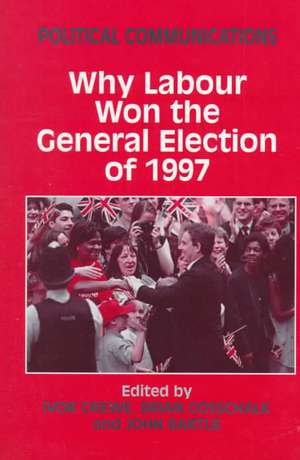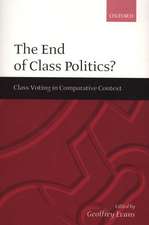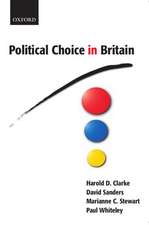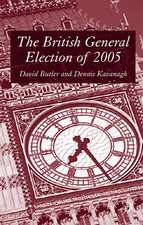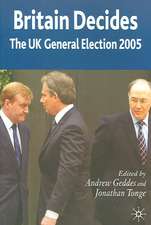Political Communications: Why Labour Won the General Election of 1997
Editat de John Bartle, Ivor Crewe, Brian Gosschalken Limba Engleză Hardback – 31 oct 1998
| Toate formatele și edițiile | Preț | Express |
|---|---|---|
| Paperback (1) | 392.24 lei 6-8 săpt. | |
| Taylor & Francis – 30 mar 2000 | 392.24 lei 6-8 săpt. | |
| Hardback (1) | 1059.00 lei 6-8 săpt. | |
| Taylor & Francis – 31 oct 1998 | 1059.00 lei 6-8 săpt. |
Preț: 1059.00 lei
Preț vechi: 1291.46 lei
-18% Nou
Puncte Express: 1589
Preț estimativ în valută:
202.63€ • 212.14$ • 167.67£
202.63€ • 212.14$ • 167.67£
Carte tipărită la comandă
Livrare economică 05-19 aprilie
Preluare comenzi: 021 569.72.76
Specificații
ISBN-13: 9780714649238
ISBN-10: 0714649236
Pagini: 280
Dimensiuni: 156 x 234 x 27 mm
Greutate: 0.58 kg
Ediția:1
Editura: Taylor & Francis
Colecția Routledge
Locul publicării:Oxford, United Kingdom
ISBN-10: 0714649236
Pagini: 280
Dimensiuni: 156 x 234 x 27 mm
Greutate: 0.58 kg
Ediția:1
Editura: Taylor & Francis
Colecția Routledge
Locul publicării:Oxford, United Kingdom
Recenzii
'Philip Gould's contribution to the Essex book stands out as a rhapsodic, yet not unrealistic summary of the Blair strategy ... these useful books, with their micro-work on the techniques of campaigning and on the conduct of the media - and politicians' attempts to spin its coverage - offer a contribution to the answers in a professional way.' - Times Literary Supplement
'This book, in the Political Communications series which has analysed British elections since 1979, reports a conference held when the dust had just settled, and will be required reading in all party headquarters ... the book's greatest usefulness lies in its demolition of some myths that have gained currency.' - Contemporary Review
'This collection of essays, the fifth from this source since the general election of 1979, is, as can be imagined, invaluable for students, journalists and anyone else who needs a meticulous and concise collection of statistics, analysis and insight ... a number of the essays give a sense of what New Labour is and where it is going.' - British Journalism Review
'This book, in the Political Communications series which has analysed British elections since 1979, reports a conference held when the dust had just settled, and will be required reading in all party headquarters ... the book's greatest usefulness lies in its demolition of some myths that have gained currency.' - Contemporary Review
'This collection of essays, the fifth from this source since the general election of 1979, is, as can be imagined, invaluable for students, journalists and anyone else who needs a meticulous and concise collection of statistics, analysis and insight ... a number of the essays give a sense of what New Labour is and where it is going.' - British Journalism Review
Cuprins
Part 1 Party strategies: why Labour won; Philip Gould; why the Conservatives lost, Daniel Finkelstein; Sausages or Policemen? the role of the Liberal Democrats in the 1997 general election campaign, Richard Holme and Alison Holmes; the role of Labour's advertising in the 1997 general election, Chris Powell; the Conservative Party's advertising strategy, Steve Hilton. Part 2 Campaigning and opinion polls: the media and the polls - pundits, polls and prognostications in British general elections, Robert M. Worcester; constituency campaigning in the 1997 general election - party effort and electoral effort, David Denver and Gordon Hands; the first Internet election? UK political parties and campaigning in cyberspace, Stephen Ward and Rachel Gibson; swingers, clingers, waverers, quaverers - the tabloid press in the 1997 general election, David McKie; leaders and leading articles - characterization of John Major and Tony Blair in the editorials of the national daily press, Colin Seymour-Ure. Part 4 The campaign on television: too much of a good thing? television in the 1997 election campaign, Peter Goddard et al; change in the air - campaign journalism at the BBC, 1997, Jay G. Blumler and Michael Gurevitch; television and the 1997 election campaign - a view from Sky News, Adam Boulton; the debate that never happened - television and the party leaders, 1997, Richard Tait. Part 5 The regulation of television in elections: debate on Section 93 of the Representation of the People Act in favour - the case for the society for the prevention of cruelty to candidates, Austin Mitchell; debate on Section 93 of the Representation of the People Act the case against - scrap it, Ivor Gaber; regulations, the media and the 1997 general election - the ITC perspective, Stephen Perkins; legal constraints, real and imagined, Colin Munro.
Notă biografică
John Bartle, Ivor Crewe, Brian Gosschalk
Descriere
The dialogue conducted via the press, television, advertising and the opinion polls beween politicians and the people in the 1997 campaign and its run-up is analyzed in this work.
